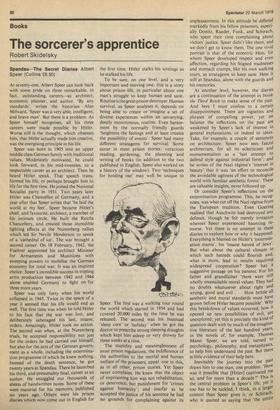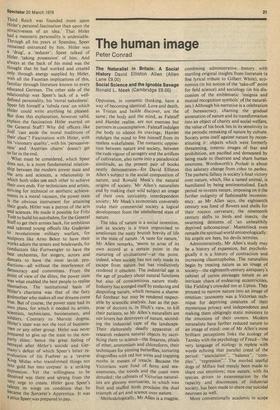The sorcerer's apprentice
Robert Skidelsky
Spandau—The Secret Diaries Albert Speer (Collins £6.50) At seventy-one, Albert Speer can look back with some pride on three remarkable, in fact, outstanding, careers—as architect, economic planner, and author. 'By any standards', writes the historian Alan Milward, 'Speer was a very able, intelligent, and brave man'. But there is a problem. As Speer himself recognises, all his three careers were made possible by Hitler. Worse still is the thought, which obsesses him, that Hitler actually made him creative, was the energising principle in his life.
Speer was born in 1905 into an upper middle class German family with traditional values. Moderately motivated, he could look forward, in his mid-twenties, to a respectable career as an architect. Then he heard Hitler speak. That speech transformed his life, or perhaps brought him to life for the first time. He joined the National Socialist party in 1931. Two years later Hitler was Chancellor of Germany, and a year after that Speer writes that 'he laid the world at my feet'. Speer became Hitler's chief, and favourite, architect, a member of his intimate circle. He built the Reichs Chancellery, and created those incredible lighting effects at the Nuremberg rallies which led Sir Nevile Henderson to speak of a 'cathedral of ice'. The war brought a second career. On 18 February, 1942, the Fuehrer appointed his architect Minister for Armaments and Munitions with sweeping powers to mobilise the German economy for total war. It was an inspired choice: Speer's incredible success in tripling arms production between 1942 and 1944 alone enabled Germany to fight on for three more years.
Speer was only forty when his world collapsed in 1945. Twice in the space of a year it seemed that his life would end as well. The first time was when he told Hitler to his face that the war was lost, and deliberately sabotaged his last, insane, orders. Amazingly, Hitler took no action. The second was when, at the Nuremberg trials, he accepted responsibility not just for the orders he had carried out himself, but also for the acts of the German government as a whole, including the extermination programme of which he knew nothing. Instead of the death sentence, he got twenty years at Spandau. There he launched his third, and presumably final, career as an author. He smuggled out thousands of sheets of handwritten notes. Some of these were material for his memoirs, published six years ago. Others were his prison diaries which now come out in English for the first time. Hitler stalks his writings as he stalked his life.
To be sure, on one level, and a very important and moving one, this is a story about prison life, in particular about one man's struggle to keep human and sane. Routine is the great prison destroyer. Human survival, as Speer analyses it, depends on being able to create or imagine a set of diverse experiences within an unvarying, deeply monotonous, routine. Even harassment by the normally friendly guards 'heightens the feelings and at least creates the possibility of events'. Speer had many different stratagems for survival. Some occur in most prison stories: voracious reading, gardening, the planning and writing of books (in addition to the two published in English, Speer also worked on a history of the window). Two 'techniques for holding out' may well be unique to Speer. The first was a walking tour round the world which started in 1954 and had covered 20,000 miles by the time he was released. The second was his biannual 'sleep cure' or *holiday' when he got the doctor to prescribe strong sleeping draughts which kept him asleep or very drowsy for three weeks at a time.
The stupidity and meaninglessness of most prison regulations, the indifference of the authorities to the mental and human welfare of the prisoners, appal one in this, as in all other, prison stories. Yet Speer never complains. He knew that the object of imprisoning him was not rehabilitation, or deterrence, but punishment for 'crimes against humanity'; and insofar as he accepted the justice of his sentence he had no grounds for complaining against its
unpleasantness. In this attitude he differed markedly from his fellow prisoners, especially Donitz, Raeder, Funk, and Schirach, who spent their time complaining about victors' justice. Speer didn't like them, and we don't get to know them. The one vivid portrait is that of the eccentric Hess, for whom Speer developed respect and even affection, regarding his feigned madnesses and stomach cramps, like his own walking tours, as stratagems to keep sane. Hess is still at Spandau, alone with the guards and his memories.
At another level, however, the diaries are a continuation of the attempt in Inside the Third Reich to make sense of the past. And here I must confess to a certain disappointment. There are vignettes and phrases of compelling power, yet on balance the reflections on the past are weakened by Speer's lack of interest in general explanations, or indeed in ideas. Take, for example, a couple of sentences on architecture. Speer now sees fascist architecture, for all its eclecticism and monumentalism as a `last attempt to defend style against industrial form'; and he writes of the Nazi regime's 'interest in beauty' that it was 'an effort to reconcile the avoidable ugliness of the technological world with familiar aesthetic forms'. These are valuable insights, never followed up.
Or consider Speer's reflections on the extermination programme. This, he recognises, was what cut off the Nazi regime fronl the European tradition. Even Goering realised that Auschwitz had destroyed any defence, though he felt merely irritation whereas Speer experienced haunting remorse. Yet there is no attempt in these diaries to explore how or why it happened. Everything is blamed on Hitler's 'extermination mania', his 'insane hatred of Jews . But what about the cultural climate In which such hatreds could flourish and, what is more, lead to results requiring widespread cooperation ? Speer has a suggestive passage on his parents. For his father and grandfather `there were still wholly unassailable moral values. They had no doubts whatsoever about right and wrong, good and evil . . How brittle all aesthetic and moral standards must have grown before Hitler became possible'. Why this breakdown of values occurred, how it opened up new possibilities of evil, are unexplored; yet this is precisely the kind of question dealt with by much of the imaginative literature of the last hundred years, in the novels of, for example, Thomas Mann. Speer, we are told, turned . to psychology, philosophy, and metaphysics, to help him understand the past. But there is little evidence of their help here. Inevitably the journey into the Past draws him to one man, one problem. 'How was it possible that [Hitler] captivated, al.e so, and for more than a decade?' This 1.s the central problem in Speer's life, yet it too has to be tackled, I think, in a larger context than Speer gives it, or Schirach, who is quoted as saying that `the entire
Third Reich was founded more upon Hitler's personal fascination than upon the attractiveness of an idea.' That Hitler had a mesmeric personality is undeniable. Through all his years at Spandau, Speer remained entranced by him. Hitler was ydrug', a 'seducer', Speer talked of Hitler 'taking possession' of him. And always at the back of his mind was the thought that he had worked and created only through energy supplied by Hitler, With all the Faustian implications of this, familiar through literature known to every educated German. The other side of the relationship was Speer's lack of a welldefined personality, his 'moral nakedness'. Speer felt himself a 'tabula rasa' on which Hitler could write anything he pleased. But does this explanation, however valid, explain the fascination Hitler exerted on the General Staff? Why did officers like Jodi 'cast aside the moral traditions of their class'? Fascination with Hitler, with his 'visionary quality', with his 'persuasiveness' and 'Austrian charm' doesn't get us far in the end.
What must be considered, which Speer does not, is a more fundamental relationship between the modern power state and the arts and sciences, a relationship in Which both sides use each other to achieve their own ends. For technicians and artists, Striving for technical or aesthetic achievements in a moral vacuum, the power state IS the obvious instrument for attaining their goals. Hitler was a patron of the arts and sciences. He made it possible for Fritz Todt to build his autobahns, for the General Staff to get their armies back, for ambitious and talented young officei's like Guderian to revolutionise military warfare, for sculptors like Arno Beker to have their Works adorn the streets and boulevards, for Conductors like Furtwengler to have the best orchestras, for singers, actors and dancers to have the most lavish productions—all without the interference of democracy and committees. From the Point of view of the elites, the power state was what enabled the best people to realise themselves. The institutional basis of Hitler's charisma was that of the fairy godmother who makes all our dreams come true. But of course, the power state had its oWn plans, for which it needed its artists, scientists, technicians, businessmen, and soldiers. Contrary to Marxist dogma, Hitler's state was not the tool of businessMen or any other group. Hitler was never Prepared to give up the state to the nonParty arty elites: hence the great feeling of betrayal after Hitler's suicide and GerMany's defeat of which Speer's bitter reevaluation of his Fuehrer as a 'reverse !Cillg Midas who transformed things not Into gold but into corpses' is a striking expression. Yet the willingness to be deceived was there and sprang from the very urge to create. Hitler gave Speer's talents its wings on condition that he became the Sorcerer's Apprentice. It was a Price Speer was prepared to pay.



































 Previous page
Previous page